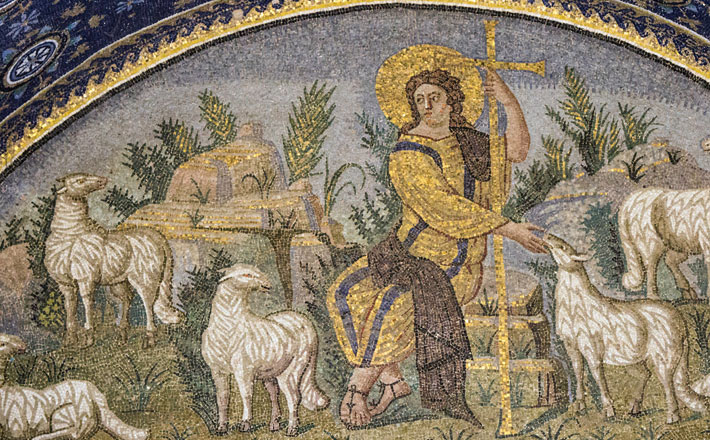Commentary on Acts 4:5-12
When it comes to modern preachers, “boldness” may not inherently be a virtue.
While no one wants a milktoast speaker, many of us associate “boldness” with religious voices too arrogant and unsophisticated for our liking. However, today’s first lesson features a “boldness” characterized not by volume but by the Spirit, which manifests itself at just the time of need. Perhaps this “boldness” is more needed today than we typically realize.
I. The literary context: “Ya got trouble”
Our first lesson takes place in the larger context of Acts 3:1-4:31, the first instance of conflict between Jesus’ witnesses and local authorities. The precipitating causes are a lame man’s healing (3:1-10) and Peter’s public proclamation (3:11-26). Positive reception for his message riles the temple authorities, prompting them to arrest Peter and John for investigation (4:1-4). Today’s reading features the apostles’ response at that investigation.
II. The text at hand: A new kind of boldness
The authorities gathered for the investigation are no team of scrubs:
“Their rulers, elders, and scribes assembled in Jerusalem, with Annas the high priest, Caiaphas, John, and Alexander, and all who were of the high-priestly family” (Acts 4:5-6).
Annas was high priest in 6-15 c.e., and his son-in-law Caiaphas is high priest at this time (18-36 c.e.; John 11:49; 18:13).1 In short, Acts 4:5-6 sets the scene for a serious examination by Jerusalem’s foremost leaders.2
The leaders ask directly: “by what power or by what name did you do this?” (4:7) The entire incident recalls earlier words of Jesus:
“When they bring you before the synagogues, the rulers, and the authorities, do not worry about how you are to defend yourselves or what you are to say; for the Holy Spirit will teach you at that very hour what you ought to say” (Luke 12:11-12).
Not only does Acts 4:5-12 resonate with Luke 12:11-12 in language and tone, it also accurately foresees how Jesus’ followers will respond. Peter is “filled with the Holy Spirit” (Acts 4:8) and answers in a way that the narrative ultimately calls “boldness” (4:13, parresia). This is the first instance of many in Acts where Jesus’ witnesses proclaim with a “boldness” that stems from the power of the Spirit (4:29-31; 9:27-28; 13:46; 14:3; 18:26; 19:8; 26:26; 28:31). Under this intense atmosphere of investigation, the Spirit’s “bold” empowerment first manifests itself, and at just the right time.
“Bold” is certainly what Peter’s answer is. After reiterating the grounds for investigation (Acts 4:9), he declares emphatically:
“Let it be known to all of you, and to all the people of Israel, that this man is standing before you in good health by the name of Jesus Christ of Nazareth, whom you crucified, whom God raised from the dead. 11This Jesus is ‘the stone that was rejected by you, the builders; it has become the cornerstone.’ 12There is salvation in no one else, for there is no other name under heaven given among mortals by which we must be saved” (Acts 4:10-12).
Peter’s response names several themes representative of apostolic preaching in Acts. First, he addresses not simply the leaders, but “all the people of Israel” (v. 10; see 2:14b, 22, 36; 9:15; 13:26, 38, 46; 28:20). Second, after attributing Jesus’ death to the leaders of Jerusalem (cf. 2:23-24; 3:14-15; 4:27-28), he emphasizes that “God raised [him] from the dead” (4:10). More than any other evangelist, Luke emphasizes the resurrection as Jesus’ vindication (Acts 2:22-36; 3:13, 26; 5:30; 10:40; 13:31-38; see also 24:21; 26:8; 26:23). Third, Jesus’ rejection by those in authority fulfills scripture, as implied by Peter’s quotation of Psalm 118:22 in Acts 4:11 (see also Luke 24:44-47; Acts 2:22-36; 3:18; 13:31-38; 26:22-23; cf. Matthew 21:42; 1 Peter 2:7). Fourth, the message of Jesus entails “salvation” (soteria) — a divine reality that generates wholeness, restoration, and reversal of societal norms (“healed” in Acts 4:9 is literally “saved,” sesotai).3 Fifth, the language of necessity (“must,” dei, v. 12) about being “saved” is distinctive language of Luke-Acts for identifying matters “necessary” to the overarching purposes of God (Luke 2:49; 4:43; 9:22; 13:14, 33; 17:25; 21:9; 22:37; 24:7, 26; Acts 3:21; 19:21; 23:11). Altogether, Peter’s response in Acts 4:8-12 uses distinctive themes of Luke-Acts to express a bold declaration about the saving nature of Jesus.
III. Reflections: “Boldness” in today’s world
In today’s pluralistic society, interpreters rightly stumble over the exclusiveness of Peter’s language: “There is salvation in no one else, for there is no other name under heaven given among mortals by which we must be saved” (Acts 4:12). Taken at face value, this word excludes. However, in its original context the apostles did not aim to exclude future religious movements, but rather to validate the message of Jesus before a hostile audience and world. In this context, the Spirit’s “boldness” empowered a frank and straightforward emphasis that was seemed necessary. Whether or not a “boldness” empowered by the Spirit today should be so one-dimensional is another question. In short, the contexts of the first audiences of Acts 4:5-12 are very different than our own. While Peter’s words undoubtedly emphasize the distinctiveness of salvation associated with Jesus, how the same Holy Spirit empowers us to express the good news of Jesus “boldly” today is a matter of ongoing dialogue and discernment. Nonetheless, as with the earliest apostles, we are no less in need of Spirit-driven boldness today, lest the world never recognize “companions of Jesus” (Acts 4:13) in their midst.
Notes:
1 Cf. Josephus, Ant. 18.2.2; 20.9.1. The identities of John and Alexander (4:6) are unknown, but some manuscripts read “Jonathan” instead of John. (Jonathan was the name of Annas’s son, who became high priest in 36-37 c.e.)
2 Joseph Fitzmyer concludes that these groups constituted “a formal session of the Jerusalem Sanhedrin. . . , the highest group of religious authorities in Jerusalem” (The Acts of the Apostles [Anchor Bible 31; New York: Doubleday, 1997], p. 299). Cf. Acts 6:12; 19:35; 23:9.
3 See, for instance, Luke 6:9; 8:36, 48, 50; 17:19; 18:42; Acts 7:25; 14:9. For more on this topic, see Joel B. Green, “‘The Message of Salvation’ in Luke-Acts,” Ex Auditu 5 (1989): 21-34; Green, “‘Salvation to the Ends of the Earth’ (Acts 13:47): The Saviour in the Acts of the Apostles,” in Witness to the Gospel: The Theology of Acts (ed. I. Howard Marshall; Grand Rapids: Eerdmans, 1998), pp. 83-106.


April 26, 2015